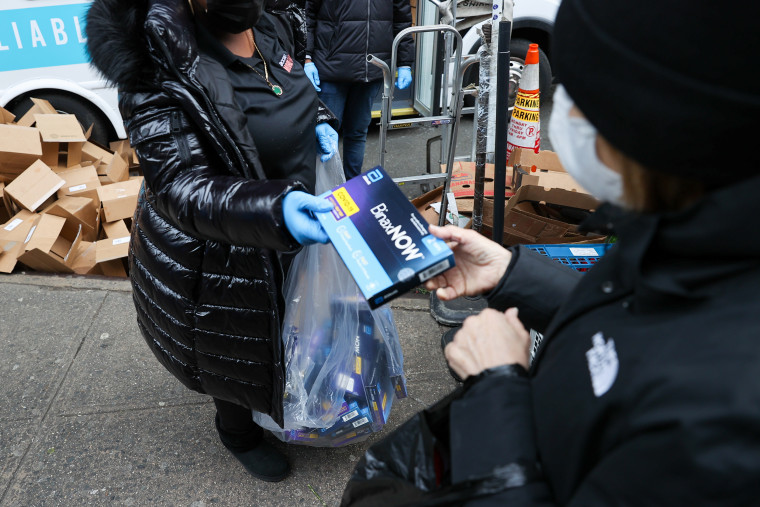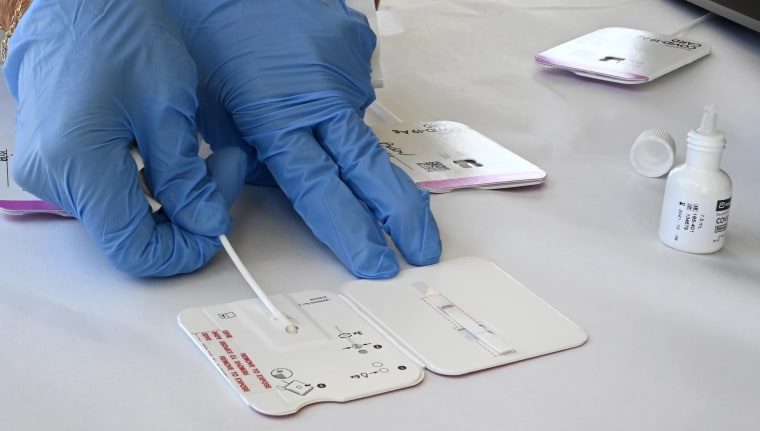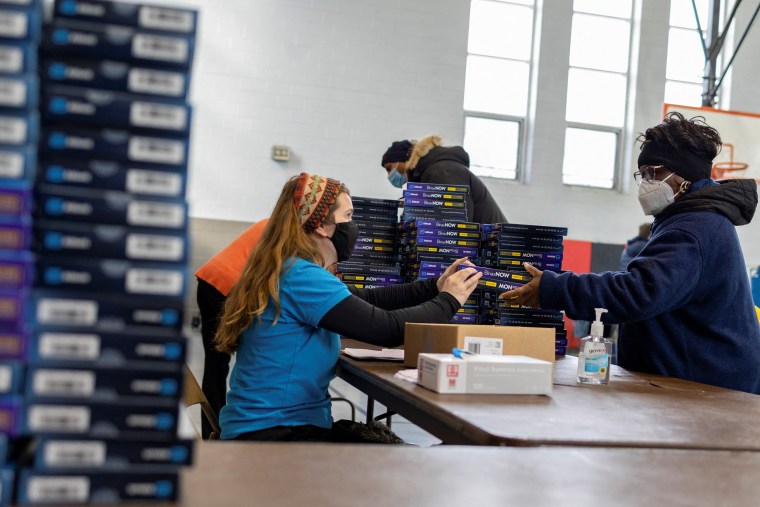At-home rapid tests have proven to be a powerful weapon in the country's battle against the coronavirus and its latest variants, but the surge of the omicron variant has left U.S. consumers to contend with concerns about access, efficacy and rising costs among the numerous options on the market.
Health experts say rapid tests remain a useful tool as the country braces for the latest surge in cases, as long as they can be obtained and are considered in the right context. The tests sacrifice some accuracy for speedy results, but they can be an aid for making decisions and knowing when to get additional treatment.
The most accurate tests available are polymerase chain reaction tests, or PCR tests, which detect tiny snippets of the virus’s genetic material. Because the tests require specialized lab equipment, people can wait for days to get their results, particularly when there are surges, as demand grows and logjams are created.
Rapid tests, on the other hand, detect molecules that are found on the virus’s surface, called antigens. They’re not as accurate, but they can be run at home and provide results in as little as 15 minutes.

The tests themselves are most accurate when a person has symptoms, studies suggest. While they are able to detect asymptomatic cases, there’s a greater likelihood for false negatives. Most experts agree that people get positive antigen results when they’re most contagious.
If the course of an infection resembles a bell curve on a chart, a PCR test is good at detecting the infection all the way through. A rapid antigen test is best at detecting within the hump of that curve, when a person is most infectious and poses the biggest risk to others.
“It takes more virus for the antigen test to be positive than it does for the PCR to be positive," said Dr. Omai Garner, the director of clinical microbiology at UCLA Health, where he runs a testing lab. "That implies that you are more infectious if you are antigen-tested-positive."
That doesn’t mean a negative antigen test should be seen as permission to do whatever anyone likes, however, especially because the omicron variant may have affected the way the bell curve works.
Garner said all of his family members, who have been vaccinated, tested positive Wednesday after days of negative results, even though they were showing minor symptoms.
Along with similar anecdotes and the Food and Drug Administration's announcement Tuesday that some antigen tests may not be as sensitive to the omicron variant, Garner said people need to be aware that while they may have runny noses or coughs but negative antigen tests, they should perhaps test themselves again a day or two later.
“These tests don’t seem to work really well in the early parts of these infections because it doesn’t look like omicron has as high a viral load in the first couple of days, as opposed to delta, which had a screaming-high viral load on Day One,” he said. “What is shifting now is, when did you get tested? Because there now appears to be a lower amount of virus early on, that might explain why the antigen tests are not showing up positive until Day Three, when there’s lots of positivity.”
A surge in demand
Before people can consider results, however, many struggle just to find tests. Increased demand has wiped out store shelves and forced retailers to limit purchases of at-home tests. Meanwhile, increased demand for PCR testing at pharmacies, medical clinics and hospitals has led to a backlog, sometimes meaning it takes several days to get results.

The increased demand coincides with the growing number of coronavirus cases, including breakthrough infections among the vaccinated, as many people try to avoid the rapid spread of the omicron variant, which has proven to be more transmissible.
"Demand has just completely outstripped supply," said Gigi Gronvall, a senior researcher at the Johns Hopkins Center for Health Security. "Certainly, a lot of right things have been done to increase access, but earlier this year there was no demand, and those tests sat on the shelves and [manufacturers] cut back on production."
The Biden administration has worked to increase production once again by investing about $3 billion. Many experts noted that the effort is coming in a surge of Covid cases and said it would have been more helpful had it come before.
Nevertheless, production is growing. Abbott Labs, which produces the BinaxNOW at-home tests, announced that it would increase its production of 50 million test kits per month to 70 million in January.
Prices could continue to fluctuate, but many experts said they should begin to come down as more tests come onto the market. The Biden administration has also provided 50 million rapid tests to community health centers and plans to distribute 500 million free tests beginning next month.
Later in the month, the White House is expected to release a rule that will allow people to be reimbursed through their health insurance plans if they buy at-home tests.
Specifics about the reimbursement model are still unclear, however, and some experts have criticized the effort, as the program still carries an upfront cost. Testing kits that provide one to two tests are $14 to $25 at most official retailers. The price can shoot much higher at unofficial sellers.
Andy Slavitt, a former senior adviser to President Joe Biden's coronavirus response team, who ran the Centers for Medicare and Medicaid Services during the Obama administration, said there may be a way for the administration to structure the rule to limit people's out-of-pocket expenses.
"Insurance companies are going to be required to reimburse them," Slavitt said. "There may be a way that they can be done where people can pick them up without having to pay, but it all depends on how the administration structures its rules in January. We'll have to wait and see."

Less sensitive tests
Some concerning new wrinkles regarding antigen tests' sensitivity are still being investigated, particularly as anecdotes about false negative results from rapid tests are on the rise.
The FDA said Tuesday that it was monitoring and evaluating antigen tests on the market for their sensitivity to the omicron variant, and it said preliminary data appeared to show a decline in receptivity.
"Early data suggests that antigen tests do detect the omicron variant but may have reduced sensitivity," it wrote.
The potential is concerning, but the FDA did write that the findings were preliminary and added that it was "continuing to further evaluate the performance of antigen tests using patient samples with live virus."
The FDA didn't say which test kit brands it had evaluated, and didn't share the data that led to its preliminary findings or estimate when it might conclude its assessment of the rapid tests and share its conclusions with the public.
NBC News asked four major producers of at-home tests — Abbott Labs, iHealth Labs Inc., Ellume and Quidel — for comment about their tests' sensitivity to the omicron variant.
Abbott Labs, the lone company to respond Wednesday, said it was actively monitoring the latest Covid mutations to ensure that its BinaxNOW tests can detect them. So far, a spokesperson said, the company's tests have successfully detected the omicron variant using samples of live virus.
"We’ve conducted lab analyses and tests on the omicron variant from live virus, including from the first U.S. omicron case, and BinaxNOW detected the virus in all tests we performed at equivalent sensitivity as other variants," said the spokesperson, John Koval. "Additionally, our data from customer use has not shown any change in test performance."
Dr. Anthony Fauci, Biden's chief medical adviser, clarified at the White House briefing Wednesday that rapid tests are still essential and that the FDA released its initial findings to be fully transparent.
"What the FDA was saying [was] that when they were looking at the sensitivity with regard to omicron, in some of the tests, there appears to be somewhat of a diminution, not a disappearance, but a diminution of the sensitivity," he said. "The fact that the sensitivity is diminished somewhat does not obviate the importance of the, still, advantage and usefulness of these tests under different circumstances."
